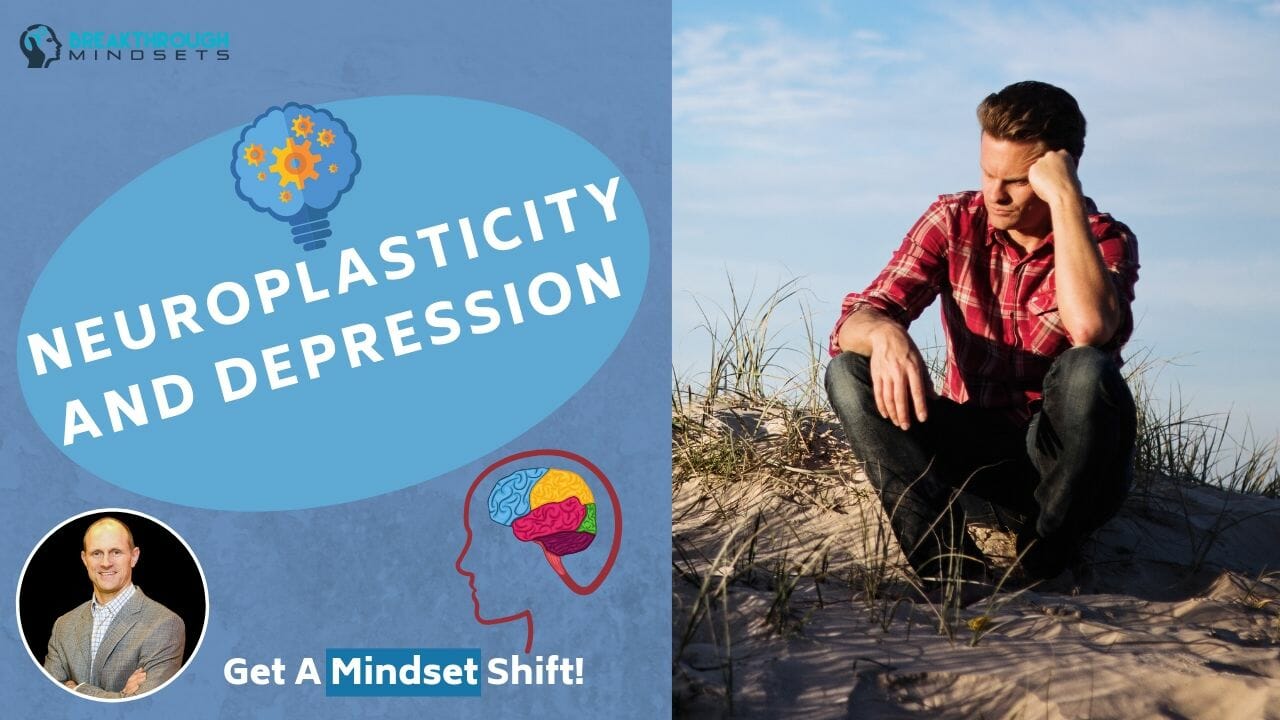Neuroplasticity Depression
What I’m about to show you in this Brain training video are three things you can do to change your mind, and utilize your brains fantastic neuroplastic abilities to break out of depression. Then you won’t have to waste any more time trying to figure out what’s going on when you feel depressed. We’re talking about neuroplasticity and depression. Let’s do it!
I know what it feels like to be depressed. It feels awful. But you know what, everyone experiences depression now and then in life, it’s human. In fact, many people out there are depressed and they don’t even know it, they just assume that’s what life is like.
When I’ve gotten depressed in the past, I didn’t want to do anything. I felt lethargic, low energy, and lost interest in things that used to turn me on. Apathy set in and I just didn’t care about the things that normally mattered to me. Maybe you know what that’s like. The good news is that you can breakthrough depression and feel better today, without anti-depressants.
Hey, I’m Dave Ryder from Breakthrough Mindsets.com, I’m a Breakthrough Mindset Specialist, Neuro-Programmer, and a Mind Setter. I’ve worked with people and groups for over 20 years, and all over the world for the past 10 years, and there’s one thing I can tell you about depression. Man, it is depressing!

Let’s talk a little bit about neuroplasticity.
Neuroplasticity, in a nutshell, is your brain’s ability to change and remodel itself around learning and healing. The human brain is dynamic, it adapts to changes in our environment and our reactions to it.
Did you know that anxiety and depression go hand and hand? Thinking depressed or anxious thoughts creates chemistry and neuroplasticity in the brain and the body expresses it and we feel it. That’s how we create depression and anxiety. What we think and believe can actually be damaging to our mind and body chemically, and epigenetically.
Don’t worry, you can turn all of this around once you become aware of what you are doing and start to change. When we practice and rehearse depressing thoughts they create neural networks or pathways that become automatic and conditioned. We call that Stinkin’ thinkin’ for a reason. These negative depressing and anxious thoughts affect our attitude towards change, the way we see the world, ourselves, our perceived options. These thoughts also affect the actions we take or don’t take to change the situation. But, we can change how we think, these habits are not permanent.
You need to do certain things to be anxious and depressed, it’s a skill. Here are the key ingredients for creating depression and anxiety. A thought or belief, an emotional reaction to the thought, and then practicing it over and over on a regular basis, that’s it! That’s how to create anxiety and depression.
This combination causes the brain to model itself around our thoughts making them seem real, creating a neural network of related thoughts, ideas, memories, and experiences that are stored in the subconscious mind. What we know and do every day with our clients is changing the harmful stuff they have put into their subconscious mind. It’s absolutely not permanent.
What happens if we continue to practice the same negative thoughts and beliefs? The parts of the brain that get wired for depression and anxiety will get stronger and more efficient at producing the symptoms of anxiety and depression. In other words, the brain listens and learns what we tell ourselves to be true on a regular basis.
The subconscious mind follows our orders without judgment. Our magnificent brain then starts to create our personal version of reality around what we’ve been drilling into our head. We need to control and start to put awesome thoughts, ideas, and beliefs into our own head so that our minds will begin to take us where we want to go instead. Think about it. What option does your mind have if you constantly practice limited negative thoughts and ideas? None! Your mind has nothing else to go on.
Do you remember those days of cramming for tests in high school and college? How did you remember all that information that you never used?
That’s right practice, and repetition is how you learned then, and that’s how you learn right now.
So, what do the big pharmaceutical companies have to say about depression? Well, they won’t hesitate to tell you that you have a problem and that they have the solution. Some of the time the drugs suppress symptoms, most of the time they don’t. They certainly don’t put us in control of our own health, and our thinking. You aren’t Prozac deficient, that’s not your problem. Your only problem is that you haven’t yet learned how to produce the results of health and well-being.
We change our chemistry and biology with our inner self-talk and beliefs.
What would happen if you only watered the weeds in your garden? That’s right, their roots grow deeper, they would get bigger, and they overtake the garden.
When you stop watering the weeds, stop feeding the weeds, they start to wilt and shrivel up, and all of a sudden the rest of the garden gets a chance to thrive. Isn’t that amazing? So how soon are you going to stop watering the weeds in your mind? Don’t get sucked into your negative thoughts.
Your brain is either affirming something you already know or is learning something new, even if it’s not true!
I remember growing up, we learned we had a limited number of brain cells, and our IQ when down as we aged because our brain cells stopped growing or died after the age of thirty. That was leading-edge BS back then. (BS stands for Belief System, by the way.)
If you don’t change your thinking, the world will do it for you with its own agenda, guaranteed.
So here’s what to do to use your brain’s brilliant neuroplastic abilities to start to make positive changes in your life:
Number 1. Write down your top 10 favorite depressing thoughts on a piece of paper. Then write down a positive and present opposite version of the same thought.
Number 2. Practice repeating the new healthy thought variation with strong emotion and use a stopwatch timer.
Number 3. Concentrate and focus on this once or twice a day for 5 minutes. If you go longer than five minutes, be forewarned, you might feel better, so be careful! Do not do this if you like to be depressed.
Be consistent with your practice. You are practicing what you will believe about yourself and the situation, and the cool thing is that you can believe anything you want. You are training your brain to see things in a different way.
Remember, practice makes what? Perfect! No, that’s not really the case. Perfect is a fantasy, it doesn’t exist. The goal behind practice is to make permanent. Practice makes permanent.
Let me leave you with this question. If you could change 3 things about yourself, what would they be?
Please leave your answer in the comments below, so I can make more videos. Thank you, I hope you enjoyed this video.



Leave A Comment